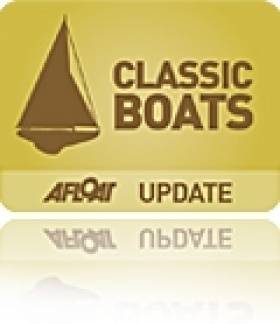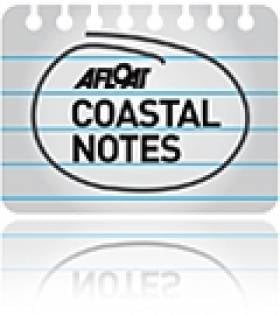Displaying items by tag: Online petition
#NaomÉanna- An online petition by campaigners has been set-up to save Naom Éanna, the former CIE Galway-Aran Islands ferry which faces scrapping by Waterways Ireland, as the date for her reprieve expires on 31 March, writes Jehan Ashmore.
Last week Sinead Eirean granted a stay of execution to scrap the Liffey Dockyard built vessel dating from 1958 and despite Minister Deenihan of the Department of Arts & Heritage and the Gaeltacht, who had rejected an appeal to save the 438 tonnes veteran vessel.
Naom Éanna is the oldest surviving example of an Irish ship built using riveted-hull construction techniques and as such she holds a unique position in the nations shipbuilding heritage. In addition she served as a vital passenger and cargo link for the Aran Islanders and the mainland and a cultural identity that campaigners also wish to recognise.
Among those campaigning have been the Naomh Éanna Trust, the Inland Waterways Association of Ireland and the Irish Ship & Barge Fabrication Company. Sam Field Corbett of the company has called for time so to implement a business plan in attracting private investment so to facilitate her restoration.
For more than a week, Naom Éanna has been berthed at a graving dry-dock owned by NAMA at the Grand Canal Dock Basin. The 137ft veteran vessel had been berthed at Charlotte Quay, her long-standing location in the basin for more than a quarter century.
Following withdrawal from Galway Bay service in 1988 she sailed to Dublin Port. The following year she was taken over by the Irish Nautical Trust and taken to her Ringsend home where marine-related businesses were based on board.
Campaign to Stop Planned Oil Drill off Dalkey Island
#DALKEY ISLAND PROSPECT - An online petition organised by Protect Our Coast in protest over plans by Providence Resources to start exploratory drilling for oil and gas off Dalkey Island, in south Co. Dublin, has reached over 2,000 signatures to date, including support from overseas.
Providence Resources are seeking permission from the Department of Environment for a foreshore licence to carry out site investigation and drill testing in waters depths of 20-30m in the Kish Bank Basin, at the Dalkey Island 'Prospect'.
They propose drilling one exploratory well some 6kms offshore, though the exact location chosen for the well site is subject to results of seismic surveys. This particularly area lies closer to the coastline, as it is on the more westerly fringes of the exploratory block (33-21) zone.
The campaigners object to the proximity of the well site off Dalkey Island which is designated a Special Protection Area (SPA). The island is home to a resident herd of goats, is rich in birdlife, seals and cetaceans, notably bottlenose dolphins in neighbouring Killiney Bay, which have drawn recent media attention and aided the objectives of the campaign, see www.protectourcoast.net
In addition they oppose the drilling location given its closeness to a large urban population and the risk of an oil-spill and consequent effects to humans and the environment throughout Dublin Bay.
If granted, exploratory work is due to start this year, with Providence claiming the entire process would take up to six months, between survey and drilling operations. During part of that timeframe, up to two seismic vessels will be employed, prior to deploying a 'jack-up' rig to the well site.
Should the oil be commercially viable, the benefits of becoming self-sufficient and security of supply would be of significant economic benefit to Ireland. To date 100% of the country's oil and 95% of its gas is currently imported, and yet most of Ireland's natural resources are unexplored, according to Providence Resources.
Exploration is an expensive exercise and has no guarantee of discovery while the timeframe from discovery to production can typically take five to seven years.
"Yet," say Providence Resources, "the implications of discovering and utilising such a natural resource, and potentially becoming self-sufficient in energy terms, would be of significant economic benefit for Ireland Inc. in terms of taxation, employment, security of supply and skills development."
To read more information about Dalkey Island Prospect from Providence Resources, with maps, montages (including views from White Rock Beach) newsletters and video presentation visit www.providenceresources.com/dalkeyisland.aspx
As previously reported on Afloat.ie, the application for the foreshore license is currently on view in Dalkey and Dun Laoghaire Garda stations. The application contains maps, plans, and drawings which can be inspected, noting the public consultation process ends on Thursday 2nd February 2012.
In addition for information from the Department of Environment's website, click HERE. Those wishing to make an objection or representation of the sought license should make submissions to the Foreshore Unit of the department on close of business (also) on Thursday 2nd February 2012.
.
- Dalkey Island Prospect
- Dublin Bay News
- Providence Resources
- Protect Our Coast
- Dublin Bay Oil drilling
- Killiney Bay
- Dalkey Island
- Dalkey Island Goats
- Dalkey Dolphins
- Department of the Environment
- Foreshore License
- White Rock Beach
- Killiney Beach
- Kish Bank Basin
- Special Protection Area
- SPA
- JackUp rig
- seismic survey
- Irish economy
- Online petition
- Well Site
- Exploratory Well Kish Bank Basin
- Cetaceans
- bottlenose dolphins

























































